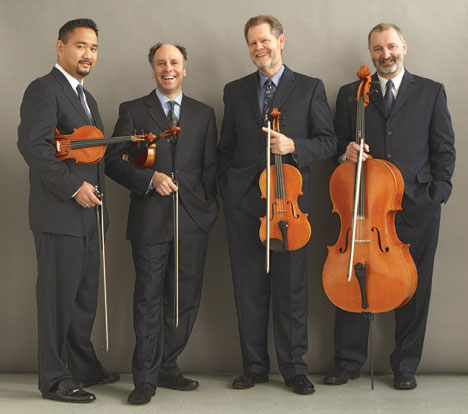Alexander Quartet brings an intimate simplicity to cornerstone rep

The Alexander String Quartet performed music of Mozart, Schubert and Ravel Wednesday night at Baruch Performing Arts Center. Photo: Rory Earnshaw
The Alexander String Quartet entered the Baruch Performing Arts Center stage Wednesday night and reminded an appreciative audience of the basic pleasures of classical music.
Basic, as in choosing, preparing, and playing string quartet music with a transparent focus on simply presenting the composers—on this night, Mozart, Ravel, and Schubert—in a clear, warm light.
The Alexander’s sound itself was amply warm, as well as grainy and supple. As opposed to the almost metallic brilliance heard from so many quartets on the contemporary scene, the Alexander prefer an intimate, quasi-vocalized style.
This fit with a subtle rehearsal-like character in their playing. Everything was fully prepared—that quality had to do with what seemed like live moments of internal discussion, the players sharing their ideas with each other, but in concert.
The result was marvelous performances of Ravel’s String Quartet in F Major and Schubert’s String Quartet No. 14, “Death and the Maiden.”
Less so was Mozart’s String Quartet No. 8, K. 168. One of the 17-year old composer’s “Haydn” quartets—inspired by and following the pioneering string quartets of the older composer—it is precocious but not genius-level music. The lyricism is there, and the succinct Andante and lively Menuetto have both Mozart’s cantabile style and his verve.
But the performance was a little clunky, especially in the context of what would come after. The Alexander didn’t seem to see the end point of Mozart’s modulations, and the phrases tended to stop at their final downbeat, with insufficient flow leading into the next bar.
The Ravel and Schubert Quartets are, of course, masterpieces of the repertoire. Ravel is always tougher and more muscular than his reputation often leads audiences to believe, but too often that is expressed by a demonstrative strength, playing that is all volume, attacks, and aggressive attitude.
The Alexander Quartet, on the other hand, showed the subtle sinews of Ravel, which is an ideal approach. Strong yes, but, like the man himself, poised and elegantly clothed. One admired the thinking that went into the playing, especially how the quartet broke out into individual voices and personalities at the most climactic moments of the first movement, and the mellow, bittersweet song of the Très lent. This was nostalgic music making, without sentimentality.
“Death and the Maiden” had an equivalent level of quality. The playing was unexaggerated and firmly within the music—there was no superfluous underlining of the musical or emotional drama, the poised playing simply carried Schubert’s voice, and that was far beyond being sufficient.
The opening announcement was serious and energetic without being violent. This was not the contemporary approach which presses the extreme edge of the piece’s tragic content. It was Schubert with a 19th-century attitude, balancing the fraught and barely contained emotional content against the music’s formal art. And the performance was artful in the extreme.
Cellist Joshua Roman and pianist Gilles Vonsattel perform 7:30 p.m. November 27 at Baruch Performing Arts Center. baruch.cuny.edu


